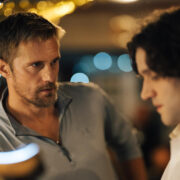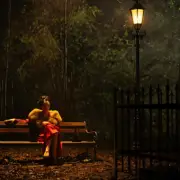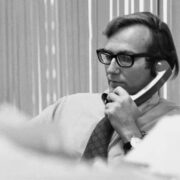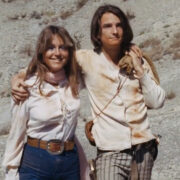Interview With Naomi McDougall Jones, Author Of “The Wrong Kind Of Women: Inside Our Revolution To Dismantle The Gods Of Hollywood”

Zofia lives in LA and is passionate about pop culture,…
“The Wrong Kind of Women: Inside Our Revolution to Dismantle the Gods of Hollywood” written by Naomi McDougall Jones paints an insightful and painful picture of a true face of Hollywood, where women are victims of sexism from day one. The actress, writer, and producer explains the mechanisms that they use and uses extensive research and data to prove it. Alongside the numbers and stats, we hear stories of hundreds of women. Once you read them, you find that they are all very similar.
The book holds not only personal stories, and extensive research but further displays the ways we can help and contribute to the change that is needed. I had a chance to chat with Naomi about her book, Quentin Tarantino and more.
Zofia Wijaszka for Film Inquiry: I’m very happy you found time to talk to me today. First of all, your book “The Wrong Kind of Women: Inside Our Revolution to Dismantle the Gods of Hollywood” is such an eye-opening picture of the Hollywood Industry and I personally believe that it should be mandatory reading in film schools.
Naomi McDougall Jones: Thank you! I intend to agree with you.
You called the book “The Wrong Kind of Women”. That’s how you describe a woman who is not “eligible” to be cast for films or series because her hair color is wrong, or she needs to lose weight, etc. Do you think this occurrence lessened throughout the years?
Naomi McDougall Jones: In some ways, I think it’s gotten worse. If you go back and look at women in films in the ’70s and early ’80s, there is actually a much broader array of how they’re allowed to look like. It’s more white, for sure, but they tend to look less perfect and they’re allowed to look a little weirder. As you get to the late ’90s and early 2000s, it becomes so much more standard and, I think, less interesting. I think one of the biggest changes that we’ve seen in recent years is an increase in on-screen representation in terms of diversity. But still, they’re there but they’re still in pretty tight slots.
When did you first have the idea for your book? How did it evolve?
Naomi McDougall Jones: I had been speaking about this issue for a number of years and then I got invited to do a TED talk about it in 2016. A year after I did it, it went viral. The week that the Weinstein story broke, ted.com put my talk on their homepage and a million people watched it in the span of three months. One of the things that happen when your video goes viral is that thousands of people email you and write to you on social media. Inside of that tsunami of messages, there was an email from a literary agent who said: “I think you have a book in you”. As soon as I got that email, I immediately said yes.
What was so great about getting to do the research for a book like this is that I’m a woman in this industry, I had my own experiences, I know a lot of women, and I talk to them about their experiences. I had to approach it from the point of the journalist and a researcher. I tried to go into the process really open-minded and pretending like I didn’t know anything so that I wasn’t bringing bias to it. I did over hundreds of hours of interviews with mostly women and some men all over the industry in terms of different jobs, different levels of famousness, and different levels of success. I listened to their stories and I tried not to ask them leading questions but listen to their career arches.
What was so stunning was the similarities that were in all of those stories. From the interviews, I was able to understand the broader trends and place that against the data. I was then able to see how does the human experience and the data line up. It brought me to my knees all over again. Even though I thought I understood, but until you really sit down and look at it, you don’t know.
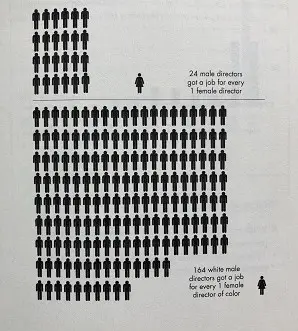
I was very interested in what you said about violence towards women on screen. Now, The Invisible Man came out, and men started saying that Elisabeth Moss wasn’t sexy enough for them. Let’s mention that it’s a film about the mental and physical abuse of a woman by her husband. Do you think that their views are a result of the ongoing trend to make violence towards women “sexy”, or is it their upbringing?
Naomi McDougall Jones: This is another thing that’s gotten worse in recent years. The problem of violence in general on-screen, specifically violence against women, has gotten way more extreme in the last twenty years. I blame it partly on Tarantino because I feel he made it “a cool movie theme”. Now, all the generations of men below him think it’s artistic to rape women. But it’s not all Tarantino’s fault (laughs). It’s so upsetting.
It’s one thing to explore what violence against women means, but more often than not it’s used as a plot device. Particularly in television shows, I noticed that they run out of the ideas and so some woman has to get raped. It’s a big problem in terms of how that affects behavior and feelings off-screen. Reviewers are mostly white men and they’re not calling it out. They have a responsibility to call that stuff out which is why I think Film Inquiry is so important in the work that you all do because we need alternative perspectives.
It’s funny how you just talked about Quentin Tarantino because I’m very torn with Kill Bill. The character of Beatrix Kiddo is raped and then beaten but at the same time we see that women come up to Uma Thurman to this day and they thank her because the film helps them get out of toxic relationship.
Naomi McDougall Jones: I share your mixed feelings on that film specifically. The problem is that it’s a woman finding empowerment out of a fundamentally broken situation. And that’s also a movie trope where women can only become free and empowered once they’ve been broken by a man first. I think that is a giant problem. But the ways it helps women find empowerment in situations that are broken is good. If it has helped women get out of abusive relationships, you can’t argue with that. With Tarantino overall, if you watch his other movies, you will notice that he foundationally hates women and wants to do violence to their bodies. If you watch Kill Bill in isolation, it would be one thing. I can’t really watch his films because I feel hated.
The subject of “beauty work” in your book shocked me. I knew it was happening but not to this degree. Do you think that this should be shared on a bigger scale? Would women not have so many issues with their bodies had it been normalized?
Naomi McDougall Jones: Part of the problem with this “beauty work” stuff is that our brains aren’t set up to process the information in which an image that looks so real isn’t real. Even now that I know and you know that women on-screen are retouched to the impossible degree, we still watch those movies. And you can say out loud to yourself that this is not real and the female character you see doesn’t look like that, we will still feel worse about ourselves because of those images.
I do think it would help a lot if that information was out there. For one thing, it would make women outraged and men outraged that we’re being fed with these images that are literally unachievable on the human body. But I also think that we have to see normal people on-screen to not feel bad about ourselves and constantly try to achieve something that is actually unachievable. I find that I have to watch British television shows every so often just to recalibrate what people actually look like and what women over the age of thirty actually look like. They’re trying to say that this is the standard of beauty. But the subliminal message is that if you don’t look like that, you are not worthy of being seen. Your story doesn’t matter to the point that you’re invisible in our culture and narrative.
According to your book, you were criticized, belittled, and bashed on multiple occasions. Why do you think Hollywood is so scared of a woman/women who is brave enough to speak up and call things as they are?
Naomi McDougall Jones: Isn’t it amazing? I can’t even explain it. It’s like high schoolers dealing with this problem. Even the idea of looking at it is so terrifying. This book has now been covered by major mainstream national and international outlets, like BBC, NPR, Washington Post, The Atlantic, Playboy even. And yet, not one single mainstream Hollywood publication has written one word about it, and it’s not because our publicist didn’t send it to them.
It’s like they’re afraid they’re going to be erased. I like how at the end of the book, you were saying how can we help. You wrote to “white dudes”, as you call them, “Just breathe. You’re going to be okay, don’t be afraid, nothing is going to happen to you.”
Naomi McDougall Jones: I think the part of it is that there is such a culture of fear in Hollywood anyway about everything. Everybody is constantly afraid that they will be thrown outside. I think this just feeds into that because everybody is so energetically engaged and maintaining this mythology of what Hollywood is. This threatens it so much because part of the image they have of themselves is this forward, liberal thinking that is not true in regards to sexism, racism, ableism, etc.
When I saw the stats, I was terrified. How long have you worked on gathering data?
Naomi McDougall Jones: For most of that data, I relied heavily on existing studies. I was given nine months by my publisher to write the book once I got the contract. I did the research for it for two months, then began writing. I’m indebted to those places that already had a lot of that research and I just had to fill in the gaps.
What were the reactions of people, especially men, after you showed them the stats?
Naomi McDougall Jones: It’s been interesting. I’ve gotten more reactions since the book came out. One thing that was very exciting is that I’ve gotten emails from quite a large number of men who didn’t believe it was true before. They said that now they will change the way they behave in their work life. The combination of the data and human stories is important. When it comes to the data only, it’s hard to wrap your mind around the fact that those are actual people and their careers. And then without the data, the human stories just sound like we’re complaining. It’s both, laid on top of each other that’s effective. The men who haven’t read the book who just heard about it, they say, “well, she’s just complaining, that isn’t true.” I had one white gentleman on Twitter say that it’s really exhausting to hear women complain all the time. I said, “Sir, it isn’t as exhausting as having to complain all the time.”
When women try to educate people on the problem of a lack of female presence in Hollywood, they often get called “oversensitive,” “too feminist,” etc. How else can they approach it? Is there even a particular way to talk about it and not being called “too feminist”?
Naomi McDougall Jones: I do think that tone matters. There is a line of argument here that it’s not fair. What we are fighting for is so righteous and so true that it sucks that we also have to worry about our tone on top of that. And that’s a completely reasonable anger to feel. But also, if the goal is to do something about it and to change people’s minds, I think tone matters a lot. First of all, the numbers are just unreasonable. Because it’s been talked about so much and so often talked about so vaguely, it can come to feel like it’s just a little bit harder and unfair for us. No, no. White men are 30% of the U.S. population and right now, they’re making 95% of the films. That means that 70% of us in the general population are being shoved into 5% of the narrative. That is just unreasonable.
Speaking from a place or reasonableness on our part and also in a way that invites them into being a part of the change is better than making them feel wrong. It’s a very subtle thing because you don’t want to coddle them. But if we continue down this path of cancel culture, where once a person is bad, they’re bad forever, we won’t have change because that’s not how movements work. You have to meet people where they are and make the possibility of change feel like an exciting, positive thing rather than “if you are not currently the wokest person you can be, then you are forever wrong.”

I was astounded about the numbers where you talk about #OscarsSoWhite. In only two years, the female presence amongst members of the Academy grew to 32%. 32! Do you think it will continue changing in every aspect of the Hollywood industry?
Naomi McDougall Jones: I think there are pockets of what people are doing on the individual and organizational levels to promote change that is effective. I definitely don’t want to minimalize what people are doing. But as a movement, we are nowhere near as effective as we need to be. Having written this book now, I’ve realized how radical we need to get. There is still this idea about incremental change and if we keep pushing the marker a little further, then we will eventually get there. But the reality is that you don’t go from 95% white men to 50%, 30% through the incremental change in our lifetimes. The math doesn’t work.
What we’re talking about here is that a very small group of people are benefiting, have all of the money, power, resources, and fame. This system isn’t working for anybody else. What the movement is doing right now is asking those people to give us some of that power, money, and resources. But I just don’t think there are a lot of historical examples of small groups of people who willingly gave away their power and resources. That large group of people for whom the system isn’t working either need to rise up and forcefully take that power or they need to invent a different game. There is a good conversation to have about which of those is the most viable path. Ideally, we do both at the same time.
The bottom line is at the DNA level, the system that exists is built to keep us out. It’s really hard to fix it because every cell of it and every step of your career is designed to elevate white men above everybody else. I think the more viable path is probably building our own game and system. I totally believe the change is possible, I just hope that we get a little more radical in our approach, our tactics, and our thinking. There is no woman ever who has had the career that she would have had if she were a white man. None, not even Kathryn Bigelow. Imagine the career Kathryn Bigelow would be having if she had a pair of testicles (laughs).
Is there anything else we can do to help? We go to women’s marches, we write about women, we support female characters in the film. What else?
Naomi McDougall Jones: All of chapter ten, as you know it, is a list of ideas on how to help. I think that for women in the industry, it is really important that we don’t shut up. We’re at the danger point now that we’re post-Weinstein and #MeToo. There’s been so many articles written and so many speeches given. People are tired of talking about this. They’re telling themselves that it’s not fixed so they don’t have to keep talking about it. It’s really important to know that it’s in no way or shape fixed. Unless we keep talking about it, it won’t ever change. We have to continue to educate ourselves, each other and the men and women that we know. The part of the problem is that most people still don’t know. The truth here is really important. Once people know, they can look for ways in which they can try to improve it.
While reading your book and seeing the reaction of men in the chapter “One Way or Another” when they say, “I looked down into my soul to ask myself, have I done anything wrong?” is so… refreshing to read. Do you think this will be the reaction of men after reading your book?
Naomi McDougall Jones: One of the emails I got from a guy was “I knew this was a problem, but I didn’t understand how the oppression was happening. I didn’t know how to recognize it in daily life. Now, I will be able to say something and help and step in.”
After reading “The Wrong Kind of Women”, I felt empowered but also sad. It’s so hard not to give up when you are rejected over and over. So at the end of our conversation – What is your word of encouragement to all of the young actresses and women in Hollywood who still struggle, even after Weinstein and #MeToo?
Naomi McDougall Jones: The title of Gloria Steinem’s new book is “The Truth Will Set You Free, But First It Will Piss You Off”. I feel like that is the experience that most women are having when reading my book. It’s really painful to know. It’s really hard to look at how really bad it is. We’ve been sold this idea that it isn’t. But it’s so much better than not knowing. I got an email from a woman who had read my book and she said that she’s been trying to be a director in Hollywood for thirty years and she has spent all of those thirty years blaming herself for her lack of career success. Until she read my book, she didn’t really understand that it wasn’t her fault. She said, “Imagine what I could have done in those thirty years if I had just known.”
The first step is knowing. Once you know, you need to know that our society needs you desperately. They need to hear your stories because they haven’t. If the system allows you to do that, that’s great. But if it doesn’t – it doesn’t matter. You have to understand that it’s not set up to recognize your value. If they don’t pick you, you cannot take it as a devaluation of yourself and your worth, and you have to find a way around them. Don’t give up because we need you.
I really think your book is a game-changer. I really think that if that book was in every film class, then women can actually know and they can be aware of the whole problem. They can be a little less hard on themselves.
Naomi McDougall Jones: I agree with you. I’m reaching out to a lot of film schools, because I think they’re doing a grave disservice by not being honest about it with your women and your men. If you were honest about the situation, then the women would be saved the ten year period that they’re going to go through, blaming themselves. Just tell them what’s happening and help them figure out tools around it. You would also give men the option to decide which side they’re on. A lot of them don’t actually want to be participating and upholding the oppression either.
I will recommend your book to everyone.
Naomi McDougall Jones: Thank you so much for reading and for taking the time.
Film Inquiry thanks Naomi McDougall Jones for taking the time to speak with us.
“The Wrong Kind of Women: Inside our Revolution to Dismantle the Gods of Hollywood” is available at bookstores and libraries nationwide as well as Bookshop.
Does content like this matter to you?
Become a Member and support film journalism. Unlock access to all of Film Inquiry`s great articles. Join a community of like-minded readers who are passionate about cinema - get access to our private members Network, give back to independent filmmakers, and more.
Zofia lives in LA and is passionate about pop culture, television. and Stevie Nicks. She graduated from the University of Wroclaw, Poland with a Bachelor’s Degree in Journalism and Social Communication with Creative Writing. Her work revolves around women in television and film. She is a staff writer First Showing and Contributing Writer for AwardsWatch, Film Inquiry, Screen Queens, and In Their Own League. She loves the 'Scream' movies, 'Carol' and 'Big Little Lies'. – @thefilmnerdette



